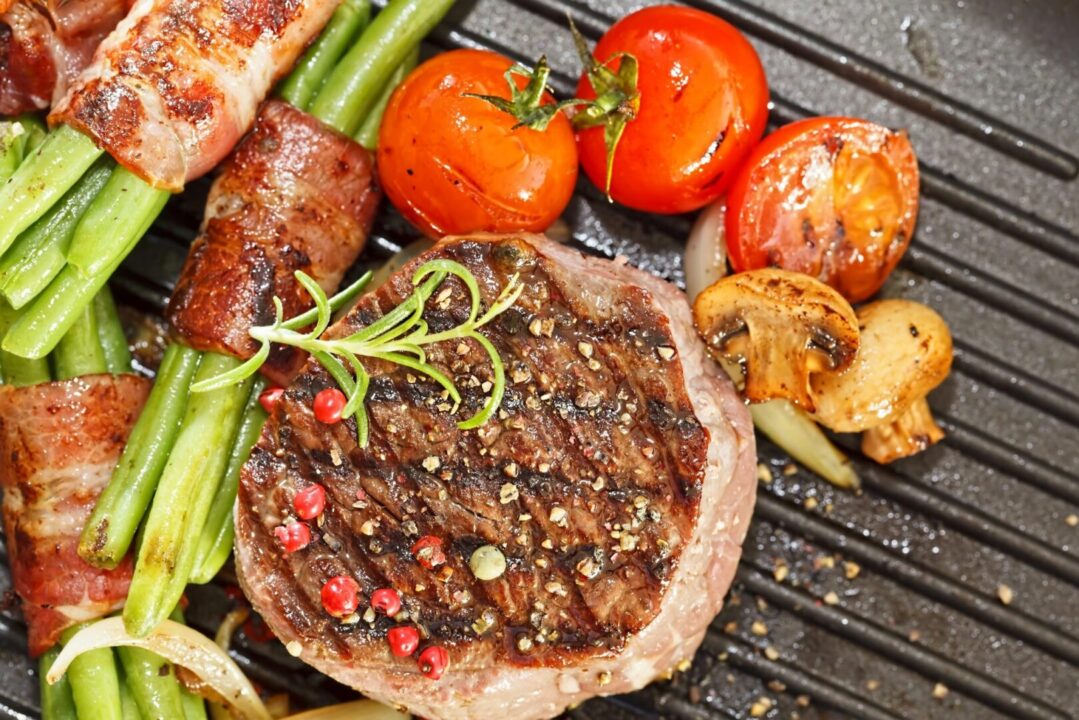The hype of Meatless Mondays and going vegan or vegetarian is making its way through society. Whether it’s just following the trend or perhaps one is making a conscious choice about their eating, avoiding meat has its benefits. However, is there a difference in the kinds of meat that you should or shouldn’t have?
Most importantly, is it red meat that should be avoided?

To shine a light on this issue, we speak to one of Farmasi Alpha.com (Kota Damansara)’s pharmacist, Kevin Leong.
1Twenty80: Firstly, what are the benefits to consuming red meat in our diet?
Kevin Leong: Red meat is very nutritious, especially those from animals that have been naturally fed and organically raised, without drugs and hormones. These are excellent sources of protein needed for building bones and muscles. It is high in iron which is essential for blood production. Moreover, heme iron (from animal source) is more easily absorbed compared to non-heme iron (plant source). Furthermore, red meat also supplies vitamin B12, zinc, creatinine, and various other nutrients that are important for maintenance of our nerves, red blood cells, and immune systems.
 1Twenty80: Why is it that we are warned to eat less red meat?
1Twenty80: Why is it that we are warned to eat less red meat?
Kevin: We are commonly warned to eat less red meat due to the numerous findings that associate the consumption of red meat with higher risk of cardiovascular disease, cancer and death. Some red meats that are high in saturated fats are responsible for increasing blood cholesterol, specifically LDL cholesterol, which in turn increases the risk of getting heart disease.
However, not all red meats have the same health effect. There were studies that highly associate processed meats such as sausages and bacon with an increase of heart disease, diabetes, and even death, while no association was found for unprocessed red meats.
There is also indeed a greater risk of developing cancer from eating red and processed meats. Reports indicate there is evidence linking the consumption of both meats to increased risk of colorectal cancer. Other studies suggest that the cooking method may also be responsible for the health effects of the meat. Harmful compounds that form when the meat is being cooked might contribute to increased risk of developing cancer.
Quote: Red meat is very nutritious, especially those from animals that have been naturally fed and organically raised, without drugs and hormones.
1Twenty80: Who should be stricter about eating red meat in their diet?
Kevin: Consuming red meat in moderation is a lifestyle habit that everyone should practice. However, there are those that require stricter dietary restrictions such as those with pre-existing or existing high blood pressure and/or high cholesterol should re-evaluate the amount of red and processed meats in their diet.
 Those suffering from diabetes are advised not to consume too much red meat as well. It may cause inflammation and obesity which will impact their eyes, gums, teeth, nerves and kidneys. Furthermore, elderly patients with diabetes should also be aware of how much protein they are consuming and monitor their urine for a frothy appearance or any swelling of body tissues due to water retention. These signs might just be an early indication of kidney failure.
Those suffering from diabetes are advised not to consume too much red meat as well. It may cause inflammation and obesity which will impact their eyes, gums, teeth, nerves and kidneys. Furthermore, elderly patients with diabetes should also be aware of how much protein they are consuming and monitor their urine for a frothy appearance or any swelling of body tissues due to water retention. These signs might just be an early indication of kidney failure.
People with high uric acid should also control their red meat intake. Red meat contains high levels of purines which break down into uric acid. Increased levels of uric acid from excess purines may accumulate in your tissues, and form crystals. This may cause high uric acid levels in the blood. Problems, such as kidney stones, and gout (collection of uric acid crystals in the joints, especially in your toes and fingers), may occur.
Quote: Consuming red meat in moderation is a lifestyle habit that everyone should practice.
 1Twenty80: What are your thoughts on red meat and climate change? Do you think it would make a difference if we ate less red meat?
1Twenty80: What are your thoughts on red meat and climate change? Do you think it would make a difference if we ate less red meat?
Kevin: As the human population continues to grow, so does its demand for food. In order to meet that demand, farmers are required to adapt and expand their farms to accommodate more livestock or crops on their land. For this reason, meat production methods such as organic farming, free range farming, and intensive animal farming have been linked to pollution through fossil fuel usage, animal methane production, deforestation, and water and land consumption.
Although it is a small step, reducing red meat in our diets may just play an important part in saving and preserving our planet. It is an act whereby anyone can participate in by just excluding or reducing meat in their breakfast, lunch, or dinner. To summarise, the less meat we consume, less pollution is generated into the environment.
1Twenty80: What supplements would you recommend for someone who is unable to eat red meat?
 Kevin: Multivitamins are always good to take whether you are able or unable to eat red meat. They provide a balanced combination of vitamins and minerals needed by everyone. A few examples include:
Kevin: Multivitamins are always good to take whether you are able or unable to eat red meat. They provide a balanced combination of vitamins and minerals needed by everyone. A few examples include:
- Vitamin B complex, specifically vitamin B12 which is important for nerves, blood flow, mental health, and energy.
- Ironis essential for blood production.
- Zinc for maintaining the body’s immune system.
- Omega-3 fatty acids for brain and eye function, anti-inflammation, and help reduce cholesterol. Example of foods include chia seeds, walnuts, algae, flaxseed, and soybeans.
- Vitamin Dand calcium are essential for maintaining bone health and building strong bones.
1Twenty80: Are there any disadvantages to removing red meat from our diets?
Kevin: The main disadvantage of excluding red meat from our diet is nutritional deficiency. The insufficient supply of iron, zinc, protein, iodine and vitamin B12 may cause symptoms of deficiency such as a weak immune system, low blood count, tiredness, hair loss, and more. In order to prevent these nutrient deficiencies, vegetarians must make greater efforts to feed themselves and acquire a great deal of knowledge about food which can be time consuming and inconvenient.
Regular body check-ups should also be done to ensure the person is not lacking any essential vitamins or minerals which can be time consuming as well.
A varied vegetarian diet is often associated with additional costs. Vegetarians may also have a harder time than meat eaters such as not having much choice in restaurants or canteens.
 1Twenty80: What is your message to our readers regarding red meat and our diets?
1Twenty80: What is your message to our readers regarding red meat and our diets?
Kevin: Consume red meat in moderation as it is essential to our diet and an important source of nutrients for our bodies. However, eating red meat and processed meats excessively is unhealthy and could contribute to increases in risk of heart diseases, high cholesterol, diabetes, cancer, and even death. Furthermore, the excessive production process of meat is also harming our planet, causing pollution and global warming.
We should all be more conscious and educate ourselves as well as others on how to maintain a healthier and longer life, at the same time taking care of our planet and environment for future generations to come.
Plant-based proteins such as soy, nuts and seeds, whole grains are an excellent source of essential amino acids. However, plant-based proteins have lower digestibility so it’s recommended to consume more protein from a variety of sources.
Quote: Consume red meat in moderation as it is essential to our diet and an important source of nutrients for our bodies.











